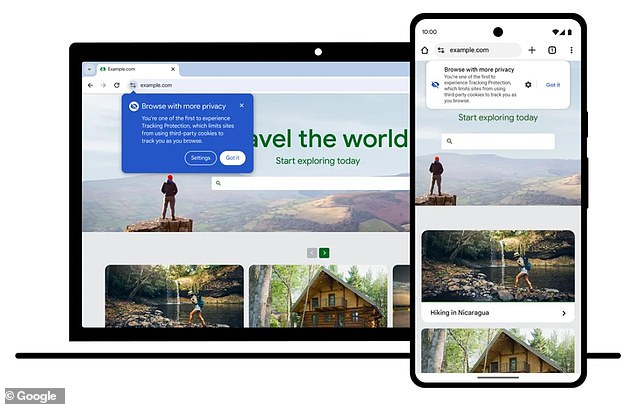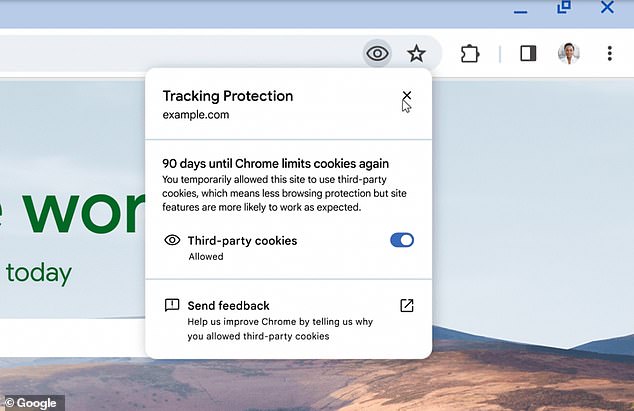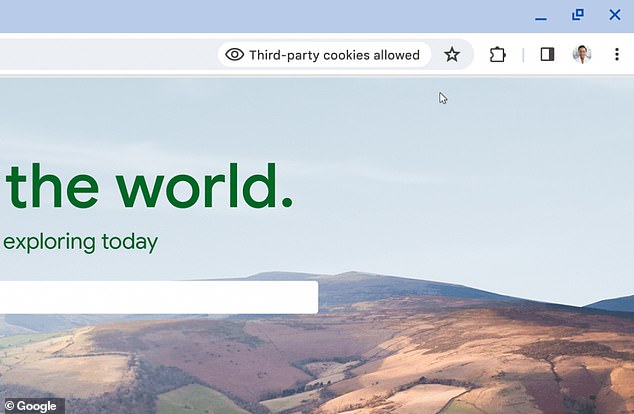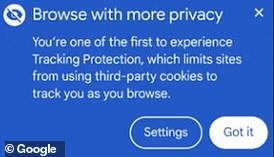Google has disabled cookies for MILLIONS of people: how do you know if you're one of them?
Google has started cracking down on third-party cookies, the small files that are downloaded to your computer or mobile device when you visit a website.
The tech giant randomly selected one percent of Chrome users worldwide – approximately 30 million people – to be the first to use the 'Tracking Protection' feature.
This measure is part of Google's controversial Privacy Sandbox and limits the use of third-party cookies to track users as they browse the web to serve relevant ads.
It comes several years after competing web browsers – Apple's Safari and Mozilla's Firefox – blocked third-party cookies by default.
Here's everything you need to know about Chrome's new change and how to determine if you're one of those affected.

From January 4, some Google Chrome users will see fewer cookies: small files that are downloaded to your computer or mobile device when you visit a website


If you are one of the randomly selected people, you will see a notification in the desktop or browser Chrome browser
As promised last month, Google rolled out Tracking Protection to one percent of users starting Thursday (January 4).
If you're one of those randomly selected for Tracking Protection, you'll see a notification in a pop-up window in Chrome for desktop or mobile.
It says, “You'll be among the first to experience tracking protection, which restricts sites from using third-party cookies to track you as you browse.”
The change happens automatically, so as you browse the web, third-party cookies will be restricted by default, limiting their ability to track you across websites.
If for some reason you want to keep third-party cookies working in Chrome, you can click the eye icon in the search bar, which has a diagonal line through it.
Once users click, they can enable the option to receive cookies, which will remove the diagonal line and display a message in the search bar that says: “Third-party cookies allowed.”
However, if you enable cookies, Google will inform you that they will automatically disable them after 90 days.
Even if you're not among the affected percent, the days of third-party cookies in Chrome are numbered.
Google plans to phase out the use of third-party cookies completely when Tracking Protection becomes available to all users in the second half of 2024, although this is subject to regulatory approval.
According to Statista, Chrome is used by more than 3.22 billion internet users, but many aren't even sure what cookies are or what they do.
Third-party cookies are created when a user visits a website that contains elements from other sites, such as images or third-party advertisements.
They contrast with first-party cookies, which are set by the site a user is visiting and are often useful because they allow the browser to remember important user information.


Anyone who for any reason wants third-party cookies to continue working in Chrome can re-enable them by clicking the eye icon in the search bar


Users have the option to enable the option to receive cookies. A message will then appear in the search bar saying: 'Third-party cookies allowed'
In a blog post Last month, Google described third-party cookies as a “fundamental part of the Internet for nearly three decades,” but they are controversial for tracking user activity on websites.
Google's problem with third-party cookies is that they are placed on a user's device by websites other than the one the user is visiting – usually by digital advertising companies.
Google plans to replace third-party cookies with a new system that limits data sharing within its own organization, which they say is better for our privacy.
Essentially, advertisers will have to ask Chrome what kind of topics they want to browse for (like fashion, food, or travel) rather than having direct access to our browsing data.
It is not without controversy, however, as regulators fear the change will increase Google's dominance of the online advertising market.
Advertisers have said the loss of cookies in the world's most popular browser will limit their ability to collect information to personalize ads and make them dependent on Google's user databases.
Google's plans to ban third-party cookies for all users by 2024 are dependent on addressing 'antitrust' concerns raised by the UK's Competition and Markets Authority (CMA).
The regulator's former CEO, Andrea Coscelli, said it would keep a “close eye” on the Silicon Valley giant and “we are under no illusions that our job is done.”
The European Union's antitrust chief Margrethe Vestager also said in June that the agency's investigation into Google's introduction of tools to block third-party cookies – part of the company's 'Privacy Sandbox' initiative – would continue .

